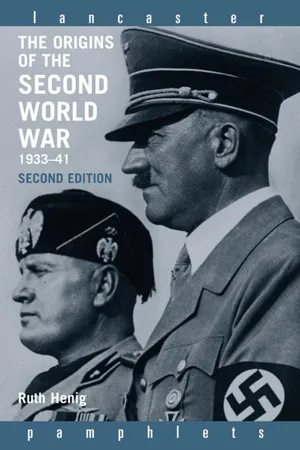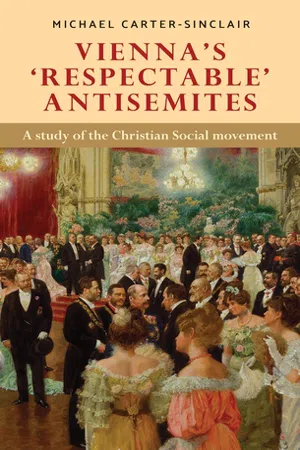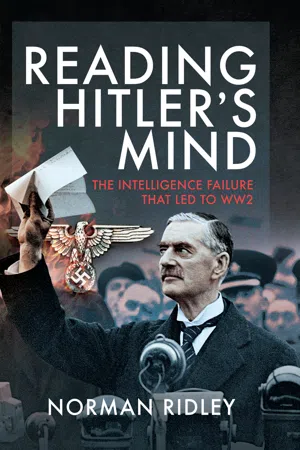Anschluss
Anschluss refers to the annexation of Austria into Nazi Germany in 1938. This event violated the Treaty of Versailles and was a significant step in Adolf Hitler's expansionist policies. The Anschluss was met with little resistance from the international community, setting the stage for further aggression by Nazi Germany leading up to World War II.
4 Key excerpts on "Anschluss"
- eBook - ePub
- Ruth Henig(Author)
- 2004(Publication Date)
- Routledge(Publisher)
...All the Catholic church bells in Vienna were ringing, and swastika banners were flying from their steeples. The next day, Hitler addressed a huge cheering crowd of around a quarter of a million people in the city centre who noisily celebrated with Hitler 'the entry of my homeland into the German Reich'. At the same time, the Viennese Nazi Party, reinforced by German SS leaders, was busy rounding up dissidents and Jews; between 10,000 and 20,000 people were arrested and taken into custody in the first stages of the Anschluss. The Anschluss was a triumph for Hitler. There had been no foreign intervention and no military or political opposition. At a stroke, Hitler had laid the foundation for his 'Greater Germany', and now further expansion eastwards beckoned. The union of Austria and Germany had stirred up pan-German feelings in neighbouring Czechoslovakia where, in the Sudeten border region, there were heavy concentrations of German-speaking people. Reeling from the shock of Anschluss, British and French leaders now had to face demands from Sudeten leaders for the incorporation of all German-speaking Czech subjects into Germany, or for full autonomy within the Czech state. The Czech government refused to entertain their demands, and in May 1938 there were rumours that Germany was ready to attack Czechoslovakia. The Czechs mobilized in readiness, but no German offensive came. The British and French governments breathed again, but Hitler was furious, believing that the failure of the anticipated German military action had made him look foolish in the eyes of other European leaders. He told his chief military and political advisers on 28 May that, when the next crisis arose, the German military response would be suitably impressive and Czechoslovakia would be wiped off the map. The date pencilled in for military action was 1 October 1938. The British government laboured through the summer to come up with a solution...
- eBook - ePub
Vienna's 'respectable' antisemites
A study of the Christian Social movement
- Michael Carter-Sinclair(Author)
- 2021(Publication Date)
- Manchester University Press(Publisher)
...10 An end to Austria? Violence erupts German forces would have overwhelmed any resistance that the Austrian army might have mustered, but it was still to be seen whether they would win over the bulk of the population for what was, in effect, an invasion. Austrians were still deeply divided about Anschluss. Christian Socials split along many lines. The Social Democrats, among the most enthusiastic supporters of Anschluss immediately after the First World War, opposed it as long as the Nazis were in power. 1 But, it did not take long to determine the general direction of events. On the evening of Friday 11 March, even rumours that German forces were coming were enough to ignite an explosion of antisemitic outrages. A long series of attacks erupted against Jews, and anyone else that the Nazis and their hangers-on saw as their enemies, or who fell into categories of people they considered ‘outsiders.’ One eyewitness to that Friday in Vienna, British journalist G.E.R. Gedye, described a ‘witches’ Sabbath,’ that consisted of crowds ‘marching side by side with police turncoats,’ letting loose cries of ‘ Heil Hitler! ’ mixed with ‘Down with the Catholics!’ 2 The targets of violence varied in number and nature. 3 A group of young males from a pro-Schuschnigg militia were herded into a building in central Vienna, stripped of their uniforms and beaten as a humiliation punishment. Whole sectors of the population were made to fear the coming regime, as a crowd estimated at between 80,000 and 100,000 marched through the Leopoldstadt, a district with a significant Jewish population. 4 German forces had secretly infiltrated Austria on 11 March, but they openly crossed the border at dawn the next day, by foot and in motorised columns, as the Luftwaffe flew across Austria, dropping leaflets trumpeting friendship between all Germans. 5 Troops were met by cheering crowds in one town and city after another...
...8 Towards war, 1938–39 The Czech crisis One of the effects of the Anschluss had been to extend Germany’s borders so that geographically Czechoslovakia’s western half became a salient surrounded by the territories of the Third Reich. This gave added strength to the demand Hitler had begun to make soon after coming to power in 1933 – that the affront to German nationhood that the artificial state of Czechoslovakia represented must be ended. Purely in terms of the internationally recognised principle of self-determination, he had a case. Czechoslovakia had been one of the new states created by the Versailles settlement. It had been formed from a number of ethnic groups, the largest being the Czechs and Slovaks, who together made up around nine million of the overall population of fourteen million. A large minority group were the three and a quarter million Germans of the Sudetenland, the ‘Southland’ in German terms, though the area formed the northern fringe of Czechoslovakia. It was the Sudeten Germans who, from 1933, under their Nazi leader, Kurt Henlein, agitated with increasing confidence and vehemence against what they described as their enforced incorporation into the bastard state of Czechoslovakia. The story began to unfold in a similar way to that of the Anschluss. Hitler personally and through the Reich foreign office issued a series of increasing demands on the Czechoslovak government to grant what would be, in effect, independence for the Sudetenland and a partitioning of Czechoslovakia. In such circumstances, the only possible salvation for Czechoslovakia lay in international pressure being applied to make Germany desist and conform to the Versailles Treaty, which had established the legitimacy of Czechoslovakia as a sovereign state. But Hitler had chosen his time well. He had got his way over rearmament, the Rhineland and the Anschluss by a mixture of bluff and threats...
- eBook - ePub
Reading Hitler's Mind
The Intelligence Failure that led to WW2
- Norman Ridley(Author)
- 2022(Publication Date)
- Frontline Books(Publisher)
...The British Empire, he argued, was under siege all around the world. Italy was challenging Britain in the Mediterranean; Japan was doing the same in East Asia. The United States would soon control the Atlantic and India and Ireland were eroding the British Empire from within. The last thing Britain wanted was to risk entanglement in a European land war. Meanwhile, domestic arguments in France made that country ‘too weak and divided to pose the slightest threat’, and an attack by France without British support was barely credible. 25 Based on their reaction to the remilitarisation of the Rhineland, Hitler had gambled on Britain and France being unwilling to face him down, but it was a gamble with the dice loaded very much in his favour. Domestically, also, he had met little opposition from a usually recalcitrant army for the Anschluss mainly because they, like him, saw little risk of the Western Allies getting sufficiently worked up about it to plunge the continent into war. The Anschluss added 6 million Austrians to the German Reich, including large numbers of recruits for the Wehrmacht. It also, crucially, allowed Germany to outflank some of the defensive positions Czechoslovakia had built along the mountainous Czech-German border. Last but not least, Germany got control of Austria’s foreign currency and gold reserves, allowing it to pay for badly needed raw materials. While the German occupation of Austria threatened important British and French interests, it did not decisively change the European balance of power...



